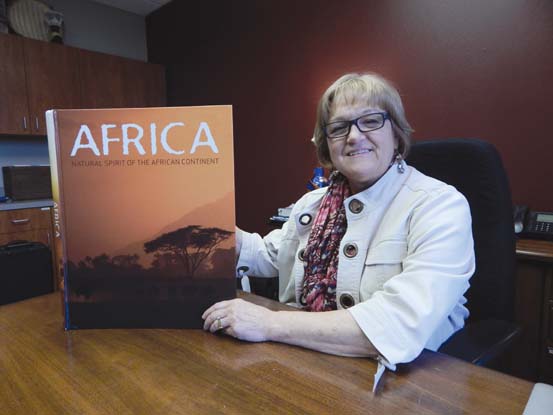
Being There – Mission trips to Africa give new meaning to being a nurse
story and photo by James Coburn
Africa has never seemed too far away to Jennifer Gray. She has carried it in her heart since her travels there began when she was a professor at the University of Texas.
“I have a real heart connection for Africa,” said Gray, associate dean of the College of Natural and Health Sciences at Oklahoma Christian University.
“Probably from those days in Cameroon, I’ve always dreamed of getting to go back,” she said. “There’s something about nurses that are doing extraordinary work.”
They don’t even realize they are working in the homeland under very impoverished conditions, she added. The African nurses are committed to their profession and communities and want to help their patients.
“I think really they are inspiring. It makes what we complain about pretty paltry,” Gray said.
Gray will return to Africa next year, but this time by funding the trip herself as OC has given her the time off in the summer. What makes the OC program unique is the thread of servant leadership, Gray said. Undergraduate students either have an experience of going to Honduras or low income local clinics. These experiences let them see how to share being a Christian nurse with people having few resources.
“We would do several days of workshops and we really got close to these Ugandan nurses,” Gray said. “We worked primarily with faculty and what I would call nurse leaders around the capitol city. But we got interested in a rural hospital that was almost in Kenya.”
Bududa is a very poor community, Gray said. The hospital had been funded by international grants, but the rest of the village is sad, she said. Baduda had suffered from a landslide between their trips there, making the situation worse in the remote village. One of the nurses had been buried in the landslide when she was assisting a patient in a clinic.
“We talked to the nurses and let them process what had happened,” Gray said. We did some things in a group setting. We sat around and about 35 of them told us what they did that day.
“They had never talked about it like that. Thinking about it, I could almost cry now thinking about it.”
Gray said the volunteer nurses never go to Africa with an agenda. Instead, they ask, “What can we do for you?” she said. They will ask the African nurses in advance how they may be of service.
“We may get there and they may have changed their mind,” Gray said. “So we’ve all spent late nights working on the next day’s workshop. Being flexible, you never know what’s going to happen.”
So Gray has learned to go with the flow, even as the timing of events can change. Being present is important. Joining the people is appreciated by them, she added.
A lot of international efforts had gone to Baduda thinking they knew exactly what the people needed. But Gray said that type of response is too paternalistic.
“We go in saying, ‘We’re walking beside you. How can we help you?’ And that sets up a different kind of relationship.”
Gray has an affinity with the board of the association, the Ugandan Nurses and Midwives Union, Some of the findings by the altruistic group of nurses has been presented to the International Council of Nurses with one of their Ugandan coworkers.
“It certainly makes me grateful for where I was born,” Gray said. “For the grace of God, I could have been born in Africa.”
Gray grew up in southwest Oklahoma. He came to OC as a student at the time when OC had an affiliation with then-Central State University, now the University of Central Oklahoma.
At the time, OC would pay to have five students in the UCO nursing program. So her nursing degree is from Central State. She then began teaching at Red River at Duncan. Gray then went to West Africa, where she worked in a mobile clinic for 20 months.
She came home and met her husband while working in admission nursing at OC and oncology before they moved to Duncan. She taught there and moved to St. Louis where she had a baby.
Her career led her to teach at the John Peters Smith School, the county hospital in Fort Worth. It’s the sister hospital of Parkland in Dallas.
“That hospital still had a vocation nursing program in the hospital,” she said. “I directed and taught in that and started working on my masters at the University of Texas, Arlington. “About the time I finished my masters at UTA, they asked me to come on the faculty. So I came on the faculty there in 1989.”
In the meantime, Gray began working on her Ph.D. at Texas Women’s University. Her doctorate was in Nursing Science, which she earned in 1997. She went on the tenure track and began a new Ph.D. program and became the associate dean there.
She instilled a masters program and most recently started the graduate program at the University of Texas Arlington before coming to Oklahoma Christian University.
Americans are in an enriched area with an access to education, Gray noted. Too often Americans do not take advantage of their abundant resources she said.
“They are so thirsty. They will come to eight hours of a workshop and then come back and do eight hours the next day,” Gray said.
The success of the mission is dependent on building relationships. The nurses do not go to Africa to change a culture, she continued.
“You go in to help them with the best way to advance their profession, advance the health of their patients in the midst of all that,” Gray said.












